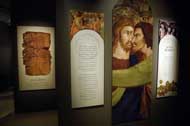Gospel of Judas Christian manuscript surfaced after 1700 years
An early Christian manuscript, which includes the only known text of the Gospel of Judas, has surfaced after 1700 years. It portrays Judas Iscariot not as a betrayer of Jesus but as his favoured disciple and willing collaborator.

The manuscript's account of events leading to the Crucifixion differs sharply from the four gospels in the New Testament, according to scholars in Washington.
The gospel portrays Jesus entrusting Judas with special knowledge and asking him to betray him to the Roman authorities. By doing so, he tells Judas, "you will exceed" the other disciples. "You will be cursed by the other generations, and you will come to rule over them."
Scholars who have translated and studied the text said this was the first time an ancient document supported a revised image of the man whose name in history has been synonymous with treachery, reports The Age.
According to Catholic Online, Jesuit Father Gerald O'Collins, a longtime professor of Christology at Rome's Pontifical Gregorian University who has convoked a series of ecumenical studies of the historical Jesus, said the text, like the gospels of Mary Magdalene and Philip, "does not merit the name 'gospel.'"
The National Geographic Society unveiled the document April 6, posting a copy of it on the society's Web site and releasing English translations of portions of the text.
"A 'Gospel' is a literary genre – established by Matthew, Mark, Luke and John – focusing on the life, death and resurrection of Jesus," Father O'Collins said.
While including events supposedly related to the life of Jesus, the Gospel of Judas and the others really are texts "attempting to bolster the importance" of the personalities they are named after, not of Jesus, the priest said.
"They are not summaries of the good news," he said.
The texts come from the gnostic tradition, a religious-philosophical current popular in the second, third and fourth centuries. The gnostics claimed to have secret knowledge unavailable to the vast majority of people and focused so strongly on the spiritual and intellectual that they despised material creation, including the human body.
In the year 180, St. Irenaeus condemned the gnostics, mentioning particularly a Gospel of Judas.
Bible Society chief executive James Catford said: "It may yield some interesting insights, but there's nothing here to undermine what Christians have believed throughout the centuries."
He said academics generally believed that the four gospels included in the Bible were all written within decades of Jesus's death and that the gospel of Judas was written between 130 and 170, "long after the real Judas lived", informs The Advertiser.
O.Ch.
Subscribe to Pravda.Ru Telegram channel, Facebook, RSS!


